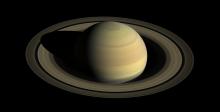Listen to today's episode of StarDate on the web the same day it airs in high-quality streaming audio without any extra ads or announcements. Choose a $8 one-month pass, or listen every day for a year for just $30.
You are here
Vernal Equinox
If it’s been a nasty winter where you are, then you have our sympathy. On the bright side, though, it’s almost over — spring arrives in the northern hemisphere today.
That doesn’t mean the weather will change overnight. The shift of the seasons is a long, slow process, not something that happens with the flip of a switch. It’s governed by the steady progression of the Sun across the sky, which is the result of the changing angle between the Sun and Earth’s poles.
At the start of spring — the vernal equinox — the Sun crosses the equator from south to north. Neither pole dips toward the Sun, so the entire planet will see roughly equal amounts of daylight and darkness.
Over the next three months, though, as Earth continues in its orbit around the Sun, the north pole will gradually dip toward the Sun. That will bring longer, warmer days to the northern hemisphere, and shorter, cooler ones to the southern hemisphere. It’ll also bring non-stop sunshine to the north pole — a “day” that will stretch almost six months from sunrise to sunset.
One other item of note is that the Sun rises due east and sets due west on the equinox. That’s not the case at other times of the year. As the Sun moves northward across the sky, its rising and setting points move northward, too. So the equinox is a good time to get your bearings right here on Earth — all part of the constant cycle of the seasons.
Another cycle in the sky tomorrow.
Script by Damond Benningfield






